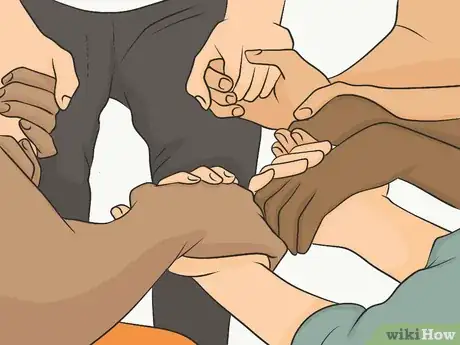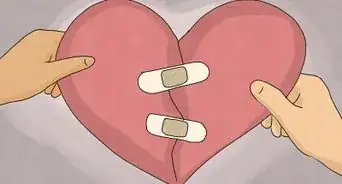This article was co-authored by Jay Reid, LPCC. Jay Reid is a Licensed Professional Clinical Counselor (LPCC) in private practice in San Francisco, CA. He specializes in helping clients who have survived a narcissistic parent or partner. Treatment focuses upon helping clients identify and challenge self-diminishing beliefs as a result of narcissistic abuse. Jay holds a BA in Psychology from the University of Pennsylvania and an MS in Clinical Psychology from Penn State University.
There are 8 references cited in this article, which can be found at the bottom of the page.
This article has been viewed 47,737 times.
Getting over a narcissist involves a unique recovery process. Your relationship may have been filled with many ups and downs, which make getting over them that much harder. You can recover successfully by, first of all, limiting contact with the narcissist. In addition, it may help to show compassion for yourself and work on your sense of self-worth.
Steps
Implementing No-Contact
-
1Recognize that the relationship was toxic. Narcissists are characterized by their outgoing personalities, inflated sense of self, and ability to pull everyone under their spell. However, if your ex was a narcissist, you might be thinking that you were the problem. Even after the relationship is over, it can be difficult to acknowledge a narcissistic partner and their toxic baggage.[1]
- They often make you feel small to inflate their own egos. They are masters of manipulation, which often leads to them having all the power and you having none. In addition, narcissists often end relationships by trying to assassinate your character (e.g. saying you cheated) when, in fact, they may have been the culprit of wrongdoing.
-
2Initiate a no-contact rule, and stick to it. Unless you have to keep in touch with the narcissist for your children or for legal issues, the best way to handle the breakup is to not communicate with them any further.[2]
- Refuse to let the narcissist re-enter your life as they please. Delete their phone numbers and email addresses. Also, un-follow them on your social media profiles.
- In order to heal completely, you may have to make a complete break. Try to maintain your boundaries, even if they try to reenter your life.
Advertisement -
3Resist the urge to play into their petty arguments. As a cat might toy with his prey, narcissists prefer to end relationships on their terms. They might break up with you and then act like it never happened the very next day. Even if you were the one who initiated the breakup, they may try to keep you in their grasp by playing games.[3]
- Don’t give in to the narcissist’s games. If they bait you with insulting texts, don’t respond. If they try to re-connect with you, stay firm in your decision to separate from them.
- Staying involved with the narcissist will only continue to cause emotional pain and delay your recovery.
-
4Ask for support from friends and family. If you need help maintaining your no-contact rule, reach out to your loved ones for support. Let them know that you are trying to cut all ties with the narcissist. Ask them to hold you accountable.
- For example, they might spend time with you on special days when you are more likely to try to contact the narcissist.
-
5
Practicing Self-Compassion
-
1Don’t place a time-limit on your healing. If you are trying to get over a narcissist, it may surprise you when months or even years later the person still seems to have an impact on your life. Recovering from a narcissistic relationship takes time. There is no precise window to allow for healing. Don’t add insult to injury by being hard on yourself for not healing fast enough.
- Recovery can take a long time. It's OK to heal at your own pace.
-
2Acknowledge your feelings. A lot of emotions and mental processes may follow a breakup with a narcissist. Don’t fight off these emotions. Allow yourself to fully feel them. You might experience sadness, anger, and even shame for not seeing all the red flags about this person.
- Give yourself permission to grieve, but don't get lost in your grief. Instead, try mindfulness by noticing your thoughts, labeling the feelings, and recognizing how they manifest in your body. Feel them and then let them go.[6]
-
3Cast out judgments. Non-stop judgment and self-doubt may have been partly what made you attractive to the narcissist in the first place. In order to get over this person and minimize your chances of entering another similar relationship, you will need to stop judging yourself.
- Resist the urge to call yourself “stupid” or criticize your inability to see the narcissist’s true nature. Remember even if you “feel” stupid, it doesn’t mean you are. Feelings are not facts.
-
4Incorporate self-care into your routine. A major part of recovery from a narcissistic relationship is self-care. When you were in the relationship with the narcissist, you may have felt like the person never truly supported you or cared for your emotional needs. Now is the time to feel that void by pouring all that love and support into yourself.
- Self-care can be anything that helps you feel relaxed and nourished. Try creating a routine of journaling, lighting a scented candle, and playing soft music. Or, pick up a new hobby, learn how to bake, or plant flowers in your garden. Do whatever makes you feel good.
-
5Join a support group. Many others have had to recover after dating or even marrying a narcissist. You can get through this by reaching out to them. Try joining a support group for others who have ended relationships with narcissists.[7]
- Ask your therapist for suggestion of groups online or in your community.
Cultivating Healthy Self-Esteem
-
1See your worth. The final days of your relationship with the narcissist may have led to you seeing yourself as far less than you actually are. Keep in mind that any negative self-talk you are falling prey to is of the narcissist’s doing. You don’t have to play into it. Take measures to uncover your true worth again.[8]
- Make a list of your best qualities and hang it up on a mirror. Set a new goal each month and track your progress towards reaching it.
- Challenge yourself to do things you never thought you would and you may find that your belief in yourself is renewed.
-
2Realize that narcissists often seek out healthy, successful people. Many people often blame themselves after ending a relationship with a narcissist. You might wonder, “what’s wrong with me?” Although you might have some self-esteem issues, you are probably a healthy, sound, and caring individual. You are likely to be deeply empathetic and compassionate for others, which is how the narcissist took advantage.
- Embrace your caring and compassionate side. Don’t push that away or vow to never trust again.
-
3Step out of the victim role. Being in a relationship with a narcissist often means playing second fiddle to their ego. You may have constantly been cast in your partner’s shadow. Realize that since the relationship is over, you don’t have to do this anymore.
- Recognize the role you played in the relationship and make a commitment to work on yourself.
- Try not to let your previous relationship define you. You can be anyone you want to be.
-
4Celebrate the non-toxic relationships in your life. You can rebuild your self-confidence by sowing into the healthy relationships around you. Take note of those people who seem to value and support you no matter what. Express gratitude for having them in your life.[9]
- Simply because one relationship was toxic that doesn’t mean all of them will be. Cherish your existing friends and family and have faith that someday you will have a healthy, satisfying relationship.
Expert Q&A
Did you know you can get expert answers for this article?
Unlock expert answers by supporting wikiHow
-
QuestionHow can I avoid being in a relationship with a narcissist in the future?
 Jay Reid, LPCCJay Reid is a Licensed Professional Clinical Counselor (LPCC) in private practice in San Francisco, CA. He specializes in helping clients who have survived a narcissistic parent or partner. Treatment focuses upon helping clients identify and challenge self-diminishing beliefs as a result of narcissistic abuse. Jay holds a BA in Psychology from the University of Pennsylvania and an MS in Clinical Psychology from Penn State University.
Jay Reid, LPCCJay Reid is a Licensed Professional Clinical Counselor (LPCC) in private practice in San Francisco, CA. He specializes in helping clients who have survived a narcissistic parent or partner. Treatment focuses upon helping clients identify and challenge self-diminishing beliefs as a result of narcissistic abuse. Jay holds a BA in Psychology from the University of Pennsylvania and an MS in Clinical Psychology from Penn State University.
Licensed Professional Clinical Counselor
References
- ↑ https://www.psychologytoday.com/blog/lifetime-connections/201704/narcissists-walk-away-relationships-turn-toxic
- ↑ http://thenarcissisticlife.com/the-no-contact-rule-the-narcissist-and-no-contact/
- ↑ https://www.psychologytoday.com/blog/tech-support/201606/why-recovering-the-narcissist-in-your-life-is-so-hard
- ↑ https://www.psychalive.org/narcissistic-relationships/
- ↑ Jay Reid, LPCC. Licensed Professional Clinical Counselor. Expert Interview. 7 August 2020.
- ↑ https://www.psychologytoday.com/blog/tech-support/201606/why-recovering-the-narcissist-in-your-life-is-so-hard
- ↑ http://www.goodtherapy.org/blog/blindsided-recovering-narcissistic-abuse-relationship-0607134
- ↑ https://pairedlife.com/etiquette/Toxic-Relationships-Recovering-From-A-Narcissist
- ↑ https://www.psychologytoday.com/blog/sense-and-sensitivity/201210/the-aftermath-narcissistic-relationship-0










































































